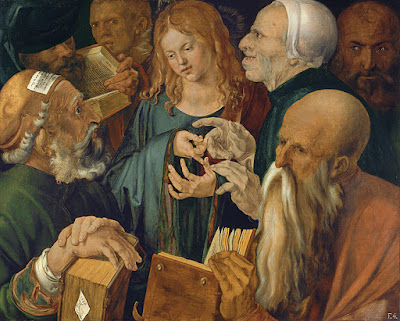I've written a few posts on here regarding
Bl. Miriam Teresa Demjanovich, a young 20-something saint who was born, raised and died in New Jersey in the first few decades of the 20th century. An American saint through and through, and I've come to appreciate her even more after reading her biography, written by Sister Mary Zita Geis. I learned many new things about this valuable intercessor of ours, and my devotion to her has certainly grown as I try to figure out how I can attain at least some of the holiness that she exuded throughout her life.
First, I learned that she was certainly a mystic. While the visions she had aren't described in too much detail here, she did experience visions of our Lord and Lady, as well as an interesting encounter with St. Therese, the Little Flower. But most of her experiences seemed to be internal, and in the writings she sent to her spiritual director, he understood that she was definitely receiving spiritual consolations from our Lord such as ecstasies, raptures, visions and locutions.
She also mortified herself daily in many different ways, offering up even the smallest of sufferings to our Lord. For instance, she at times never touched the pew in front of her while kneeling during Mass and Eucharistic Adoration, and when rapt in front of the altar itself, she never let her feet touch the ground as she kneeled before the Blessed Sacrament.
Another interesting tidbit was that she was quite into sports. Particularly, that "boys' game" known as baseball! Of course, baseball is my favorite sport, and to know that she enjoyed playing America's pastime, as well as basketball, makes her same ever more closer despite her nearly unrivaled holiness and submission to God's will. She also took part in Spanish club, as well as drama club and glee club at high school, and performed in and wrote many plays during her high school and college days. Again, this is something still done by many of our high schoolers today. Yet through all these similarities with us Americans today, she was oh so very different. Her piety and desire to conform to God's will is truly an example to us all, and I can't wait to see her become canonized so that all of the United States will properly be able to venerate her as they do St. Elizabeth Ann Seton today.
So in the biography, I came across a couple of her spiritual conferences that were not included in her posthumous book, Greater Perfection. Remember, she wrote these secretly as the rest of he congregation thought that the convent's priest was writing them. Finding these felt like finding a long lost b-side from one of my favorite bands. I'd like to share one of those conferences here, as many of these are hard to find on the Internet, as it certainly moved me, and I hope it does the same for the reader here:


































